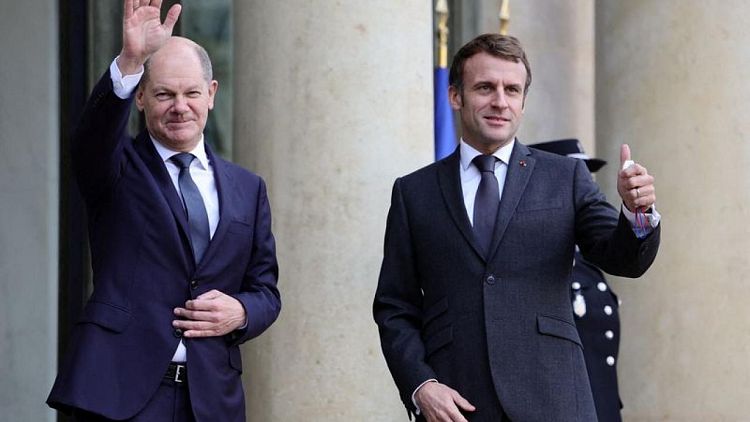By Michel Rose
PARIS - French President Emmanuel Macron welcomed new German Chancellor Olaf Scholz to Paris for an inaugural working meeting on Friday at which the two most powerful EU leaders will seek common ground on tackling crises within the bloc and beyond.
Diplomats have said the meeting might present Macron with an opportunity to seize a more senior role in the Franco-German relationship and within the European Union following Angela Merkel's departure after 17 years as Germany's leader.
"Macron is wise enough to take the lead in Europe for a couple of years," a diplomat from a small EU country told Reuters. "If he gets re-elected, he will use the time wisely to be in the forefront as Germany will be the weaker partner."
Elected in 2017, Macron will almost certainly seek a second presidential term next year although he has not yet declared his candidacy.
The size of Germany's economy, the biggest in the 27-nation EU, gives any German chancellor outsized influence.
But Macron, who said Merkel had "taught much" to the "impetuous president" he was at the start, will try to use France's presidency of the EU to advance his priorities while Scholz is finding his feet. Paris takes over the six-month rotating presidency on Jan. 1.
Arriving at the Elysee palace on Friday, the reserved Scholz was greeted with a fistbump by Macron, who then accompanied him up the steps, patting him on the back.
Heading the agenda, French officials say, will be tensions over Ukraine, which U.S. officials believe could face a Russian invasion early next year. Moscow denies any plans to invade Ukraine.
Macron developed a friendly relationship with Scholz's predecessor Merkel, who broke with German tradition by backing unprecedented joint EU efforts to raise debt during the COVID-19 pandemic.
But the two leaders were at odds over some key issues including Germany's gas imports from Russia, how to defend Europe, and relationships with other big political and economic competitors including China.
Perceived imbalances stemming from Franco-German coordination efforts have prompted other EU countries to forge mini-alliances, such as the "Frugal Four" of northern fiscal conservatives or eastern Europe's Visegrad group.
"It's good when we have couple that gets on well ... but it's never enough," Marion Gaillard, an expert on French-German relations at political studies institute Sciences-Po in Paris said.
French diplomats appear optimistic about the outlook for ties with Germany under Scholz, citing the "strategic sovereignty" in the coalition deal that took him to power, which they say echoes Macron's push for European "strategic autonomy".
Another key issue is how to finance the transition towards greener energy and whether nuclear energy and natural gas can be considered by the EU as renewable - and subsidisable - sources.
Macron wants to build new nuclear reactors in France, while German plans to phase them out are well established. The new German coalition agreement makes no mention of the issue, however, which Paris believes leaves room for compromise.
